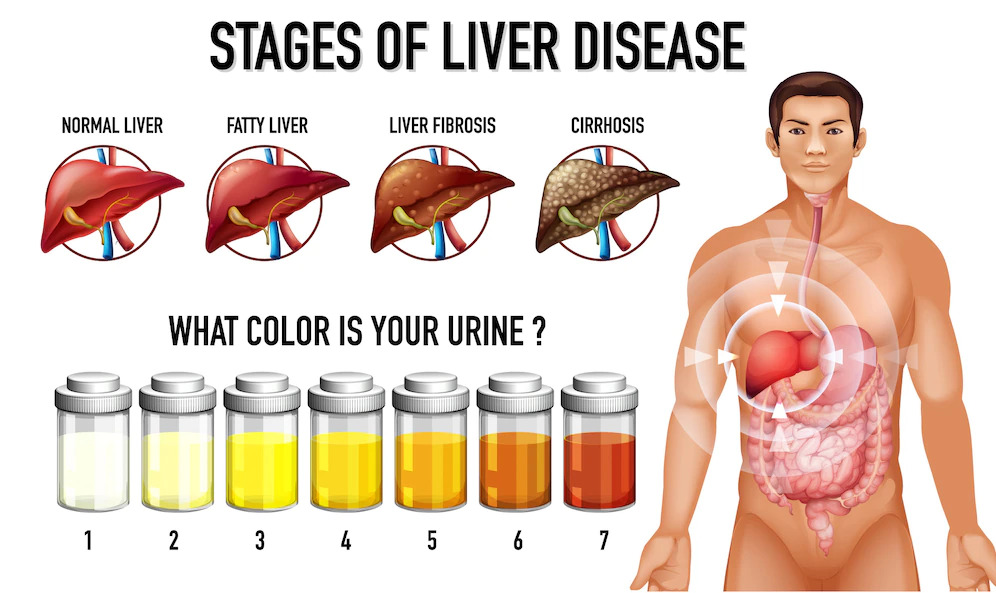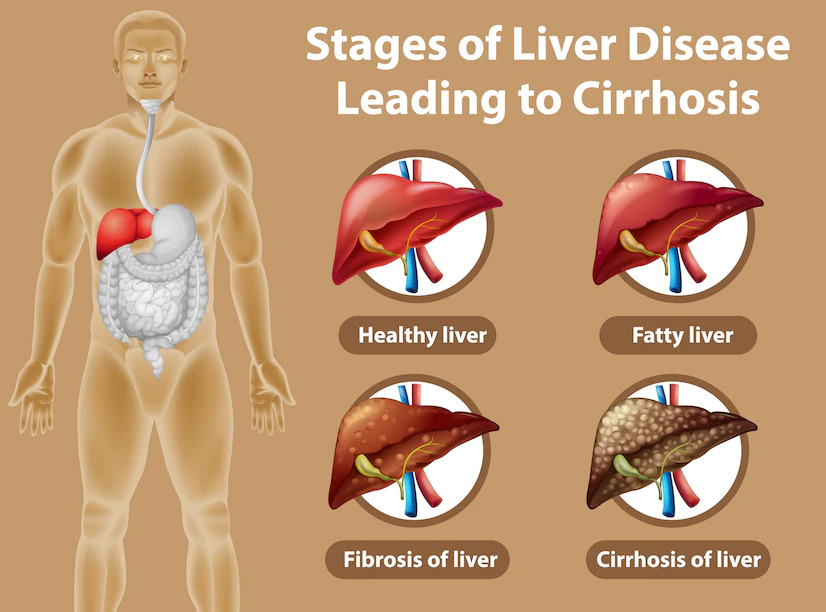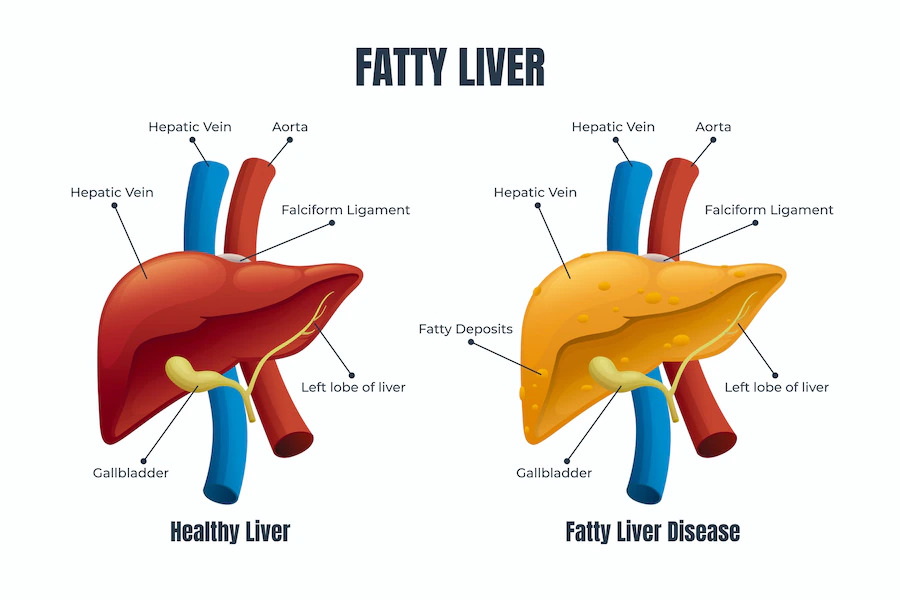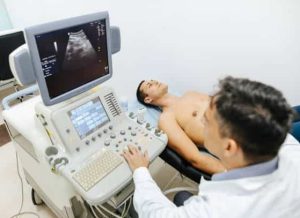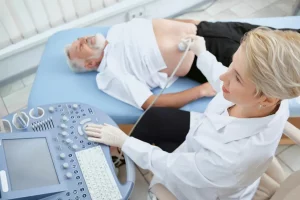Liver Shearwave Elastography
Private Liver Shearwave Elastography
Liver Shearwave Elastography
Price £359
Liver elastography scans are particularly beneficial for individuals who have liver diseases or conditions that may affect the health of their liver. Here are some examples of who might benefit from a liver elastography scan:
Patients with Chronic Liver Disease: Liver elastography is commonly used in patients with chronic liver diseases such as hepatitis B or C, non-alcoholic fatty liver disease (NAFLD), alcoholic liver disease, or autoimmune liver diseases. It helps in assessing the degree of liver fibrosis, which is crucial for disease staging, monitoring disease progression, and determining appropriate treatment strategies.
Individuals at Risk of Liver Fibrosis: People who have risk factors for liver fibrosis, such as obesity, diabetes, excessive alcohol consumption, or a history of liver damage, may benefit from liver elastography. It allows for the early detection of fibrosis, enabling timely interventions to prevent further liver damage.
Liver Transplant Recipients: Liver elastography can be useful in monitoring the health of transplanted livers. It helps assess post-transplant liver fibrosis, detect complications, and guide post-operative management.
Book Your Appointment
Please select a location and time slot to proceed with the booking
If you are unable to make a payment online, please call our office to book your appointment. We’re here to assist you!
Tel: 020 7101 3377
Our Latest Google Reviews
EXCELLENTTrustindex verifies that the original source of the review is Google. This morning I had a breast ultrasound and I just wanted to say a truly heartfelt thank you to Eduardo Murakami in St Albans. From the moment I walked in, he was incredibly comforting, calm and caring. Appointments like this can feel very overwhelming, but he put me completely at ease. He was professional and super efficient, while still taking the time to explain everything clearly and gently. Alongside his assistant, they created such a reassuring and supportive environment. I felt genuinely cared for throughout. The practice itself was spotless, welcoming and very well run. The report of findings was sent straight away, with no waiting around, which made the whole experience feel smooth and stress-free. Thank you, Eduardo, for your kindness, efficiency and professionalism. It truly made such a difference during what could have been a very anxious time.Posted onTrustindex verifies that the original source of the review is Google. Felt well looked after, friendly service.Posted onTrustindex verifies that the original source of the review is Google. The service and professionalism was very good and I highly recommend them to others.Posted onTrustindex verifies that the original source of the review is Google. Excelent diagnostic centre. You get a quick appoointment, warm and welcoming staff, professional radiologist and reports delivered on the same day. You can self refer and the prices are very competetive and value for money.Posted onTrustindex verifies that the original source of the review is Google. Such a brilliant experience from start to finish. An excellent service all round.Would highly recommend.Posted onTrustindex verifies that the original source of the review is Google. Dr Farahmandfar was really kind and reassuring. He made me feel very comfortable during the appointment, took the time to examine everything properly, and explained things clearly. A really positive experience, I would highly recommend him.
Private Liver Shearwave Elastography in London & St Albans
Fast, private Liver Shearwave Elastographyin London and nationwide. Same-day and next-day appointments, a gentle, non-invasive test, and a clear report you can share with your GP or specialist. If you’ve searched for “FibroScan near me”, “private FibroScan UK”, or “liver elastography cost”, you’re in the right place.
Use our online system to book a FibroScan in minutes, or call us for advice on the best liver scan package for you.
Chronic liver disease is increasingly common in the UK, driven by fatty liver (NAFLD/NASH), alcohol, metabolic syndrome, and chronic viral hepatitis. The good news: liver damage can often be slowed or even reversed when identified early. FibroScan also known as transient elastography is a quick, painless method to assess liver stiffness (fibrosis) and fat content (steatosis) without needles, radiation, or sedation.
Whether you’ve been told your liver enzymes are raised, you have risk factors such as diabetes, obesity, high cholesterol, or you’re simply proactive about health, a private liver elastography scan can provide clarity and a baseline to guide lifestyle or treatment changes.
What is a Liver Shearwave Elastography?
Liver Shearwave Elastography is a specialised ultrasound-based technique that sends a gentle pulse (shear wave) through the liver and measures how fast it travels. The faster the wave, the stiffer the liver tissue—an indicator of fibrosis (scarring). Most devices also provide a CAP score (Controlled Attenuation Parameter), which estimates the fat content in the liver.
- Non-invasive & safe: no needles, medication, or radiation.
- Fast: the scan itself typically takes around 10–15 minutes.
- Immediate feedback: you receive a numerical read-out and a clear, clinician-interpreted report.
- Actionable: useful for baseline assessment, monitoring progress, and informing referrals.
Is FibroScan the same as an ultrasound? Not exactly. A standard abdominal ultrasound looks at organ appearance (shape, size, lesions). Liver Shearwave Elastography measures tissue stiffness and fat content, providing complementary information. Many people choose a combined liver ultrasound + FibroScan for a complete picture.
Why liver health matters in the UK
The liver is the body’s metabolic powerhouse—processing nutrients, detoxifying chemicals, producing bile, and regulating cholesterol and glucose. Over time, conditions like NAFLD/NASH, alcohol-related liver disease, hepatitis B/C, and certain medications can cause fibrosis. If scarring progresses, it may lead to cirrhosis and complications.
Because liver disease can be silent until advanced, proactive assessment is vital—especially if you have risk factors such as central obesity, type 2 diabetes, high triglycerides, hypertension, or a family history of liver disease.
Who should consider a private Liver Shearwave Elastography?
- Raised liver enzymes on recent blood tests (ALT, AST, GGT).
- Fatty liver suspected or noted on ultrasound, CT, or MRI.
- Type 2 diabetes, obesity, metabolic syndrome, or high cholesterol.
- Regular alcohol intake above recommended limits or historic heavy use.
- Chronic hepatitis B or C (diagnosed or at risk).
- Autoimmune liver disease or inherited conditions (e.g., hemochromatosis).
- Medication-related risk (e.g., methotrexate, amiodarone—if advised by your clinician).
- Monitoring: to track response to lifestyle changes, weight loss, or treatment.
If you’re unsure whether FibroScan is right for you, our clinicians can review your history and recommend the most appropriate liver scan package.
What happens during a Liver Shearwave Elastography appointment?
- Welcome & consent: we confirm your details, medical history, and answer any questions.
- Positioning: you’ll lie comfortably on your back with your right arm raised to open the rib space.
- Scanning: gel is applied to the skin over the right upper abdomen; a small probe sends gentle pulses to measure liver stiffness. We take multiple readings for accuracy.
- Immediate results: you’ll see the numbers on screen; your clinician explains what they mean and provides a written report.
- Next steps: depending on the findings, you may be offered lifestyle guidance, blood tests, a formal liver ultrasound, or referral to a hepatology specialist if needed.
How long does it take? Most appointments last 20–30 minutes including set-up and explanation. The measurement itself is usually 10–15 minutes.
How to prepare for a Liver Shearwave Elastography
- Fasting: a light fast (e.g., 2–3 hours) can help reduce variability in some cases, but strict fasting is not always required. Follow any instructions you receive in your booking confirmation.
- Clothing: wear a two-piece outfit so your upper right abdomen can be easily accessed.
- Medications: continue your usual medicines unless your doctor advises otherwise.
- Alcohol: avoid alcohol for at least 24 hours before your scan for the most representative reading.
If you have a known condition like significant obesity or ascites, tell us in advance so we can select the most suitable probe (e.g., XL probe) to optimise accuracy.
Understanding your Liver Shearwave Elastography results
Your report includes two core outputs:
- Liver stiffness (measured in kilopascals, kPa) – higher values generally indicate more fibrosis.
- CAP score (measured in dB/m) – higher values generally indicate more fat content (steatosis).
Interpreting fibrosis (F0–F4): Your clinician will interpret the kPa value using validated cut-offs appropriate to your clinical context (NAFLD, alcohol, viral hepatitis, etc.). As a simple guide, higher kPa suggests greater stiffness. “F0” indicates no significant fibrosis; “F4” is consistent with cirrhosis. Cut-offs vary by disease and machine settings, so it’s important your results are reviewed in context.
| Parameter | What it means | How we use it |
|---|---|---|
| Liver stiffness (kPa) | Estimate of fibrosis/scarring. Higher = stiffer liver. | Helps stage fibrosis (F0–F4) and guide monitoring/referral. |
| CAP score (dB/m) | Estimate of liver fat (steatosis). Higher = more fat. | Useful for NAFLD/NASH risk assessment and tracking improvement. |
Steatosis (fat) categories: Clinics often group CAP into approximate categories (S0–S3). The exact ranges your report uses may differ slightly based on evidence updates and device generation, but your report will clearly state the category and recommended actions.
Liver Shearwave Elastography vs liver ultrasound vs MRI elastography
- Standard abdominal ultrasound: views the liver’s structure—size, shape, echogenicity (brightness), focal lesions, and nearby organs. It can suggest fatty change or cirrhosis but does not quantify stiffness.
- FibroScan (transient elastography): quantifies stiffness and fat content at the point of care; rapid and non-invasive.
- MRE (MRI elastography): can assess stiffness via MRI; powerful but more expensive and less available; not usually necessary as a first-line test.
Which should I choose? If your goal is to quantify scarring and fat quickly and cost-effectively, a private FibroScan is ideal. If you also want to check the gallbladder, bile ducts, kidneys, pancreas, or to look for focal liver lesions, combine liver ultrasound + FibroScan for a comprehensive assessment.
Private Liver Shearwave Elastography Cost in London & the UK
Private FibroScan prices in the UK typically range from £250–£450 depending on the clinic, location, whether a consultation or additional ultrasound/bloods are included, and whether you book as part of a liver health package. We keep pricing clear and competitive with no hidden fees.
- Liver Shearwave Elastography only: best for quick, focused quantification of stiffness and fat.
- FibroScan + liver ultrasound: structural + quantitative evaluation in one visit.
- Comprehensive liver package: FibroScan, ultrasound, and blood panel (e.g., LFTs, viral hepatitis if indicated) with a clinician review.
For an exact quote and the latest offers, view our prices or contact us.
Advanced Liver Health
- FibroScan + ultrasound + tailored blood panel
- Consultation with a clinician
- Clear plan for monitoring or referral
NHS vs private Liver Shearwave Elastography: what’s the difference?
NHS pathways are excellent for ongoing management but may involve waiting lists or require a specialist referral. Private FibroScan provides:
- Speed: same-day/next-day appointments and rapid results.
- Access: no GP referral required to book.
- Flexibility: combine with ultrasound or blood tests in one visit.
- Clarity: a structured report you can share with your GP/consultant.
We’re happy to communicate with your NHS or private hepatology team if you’d like us to.
Conditions commonly assessed with Liver Shearwave Elastography
NAFLD/NASH (fatty liver)
NAFLD is now one of the most common liver conditions in the UK. It’s closely linked to obesity, type 2 diabetes, and high triglycerides. FibroScan helps stratify risk and provides a measurable target for lifestyle change (weight loss, exercise, diet).
Alcohol-related liver disease
Alcohol intake above recommended limits can accelerate fibrosis. FibroScan offers a practical way to assess baseline damage and track improvement with reduced consumption or abstinence.
Viral hepatitis (B & C)
In patients with chronic hepatitis, FibroScan can support staging of disease and guide treatment timing and surveillance plans. Your readings will be interpreted using validated cut-offs for your condition.
Other causes
Autoimmune hepatitis, hemochromatosis, drug-related toxicity, and cholestatic diseases may also be monitored with elastography as part of a broader clinical assessment.
Safety, accuracy & limitations
- Safe & well-tolerated: no radiation or injections; suitable for repeated monitoring.
- Accuracy: advanced devices and correct probe selection (e.g., XL probe) improve reliability. Inflammation, heart failure, meals, and obesity can influence readings—your clinician will account for this.
- Limitations: FibroScan does not diagnose cancer or replace a biopsy when one is clinically indicated. It provides a non-invasive snapshot to guide decisions.
Locations: Liver Shearwave Elastography London & nationwide
We provide private FibroScan in London (central locations for easy access), with additional clinics across the UK. If you’re searching for “FibroScan near me”, use our booking tool to find your closest appointment.
Frequently asked questions
Is FibroScan the same as an ultrasound?
FibroScan uses ultrasound-based elastography to measure stiffness and fat, while a standard ultrasound evaluates structure. They complement each other and can be booked together.
How long does a FibroScan take?
The measurement typically takes 10–15 minutes. Expect around 20–30 minutes for the whole visit including explanation and your printed report.
How much does a private FibroScan cost in London & the UK?
Most private clinics charge between £250 and £450 depending on what’s included (consultation, ultrasound, blood tests). Check our prices or contact us for a quote.
Do I need to fast before FibroScan?
A light fast (2–3 hours) can help reduce variability, but strict fasting isn’t always required. Follow the instructions in your confirmation email.
Is FibroScan painful?
No. You may feel a gentle tapping at the probe site. There’s no injection, sedation, or recovery time needed.
Can FibroScan detect cancer?
No. FibroScan assesses tissue stiffness and fat; it doesn’t diagnose cancer. If cancer is suspected, your clinician may advise further imaging or referral.
What do the numbers mean (kPa & CAP)?
kPa reflects stiffness (fibrosis risk); CAP reflects fat content (steatosis). Your result is interpreted against validated cut-offs for your clinical context.
Is FibroScan safe in pregnancy?
FibroScan uses ultrasound-based technology and is generally considered safe; however, inform us if you are pregnant so we can advise appropriately.
Will I need a liver biopsy?
Many patients can avoid biopsy with non-invasive tests like FibroScan, blood panels, and imaging. In select cases, biopsy may still be recommended.
Can heavy meals or alcohol affect my result?
Yes—recent heavy meals and alcohol can influence readings. Avoid alcohol for 24 hours and follow prep advice for the most representative result.
Can I book without a GP referral?
Yes. Private bookings are available directly. You’ll receive a report you can share with your GP or hepatology team.
How often should I repeat a FibroScan?
It depends on your risk profile and whether you’re monitoring treatment or lifestyle change. Your clinician will agree a personalised interval (e.g., 6–12 months).
Is FibroScan accurate if I’m overweight?
Yes—accuracy can be improved with the appropriate probe (e.g., XL probe) and experienced operators. Tell us your BMI when booking.
What if my result is high?
We’ll explain what it means and outline next steps—these may include lifestyle measures, blood tests, ultrasound, or referral to hepatology. Early action matters.
What’s the difference between FibroScan and MRI elastography?
Both assess stiffness. MRI elastography is powerful but more expensive and less available. FibroScan is quicker and widely used as a first-line test.
Do you offer evening or weekend appointments?
Yes—availability varies by clinic. Check the booking calendar or call us to find a slot near you.
Book a Private Liver Shearwave Elastography Near Me
Take control of your liver health today. Book a private FibroScan in London or at one of our UK partner clinics. No referral required.
Hepatitis B, C, fatty liver disease, autoimmune hepatitis, and alcoholic liver disease are just a few of the chronic liver illnesses that can cause tissue damage and scar tissue formation. The liver loses some of its elasticity and flexibility as scar tissue accumulates.Liver shearwave elastography can detect these changes and help grading the liver damage according to the tissue elasticity.
Liver fibrosis/cirrhosis is a common endpoint for viral, autoimmune, drug-induced, and alcoholic liver disease and can be evaluated by shear wave elastography of the liver.
